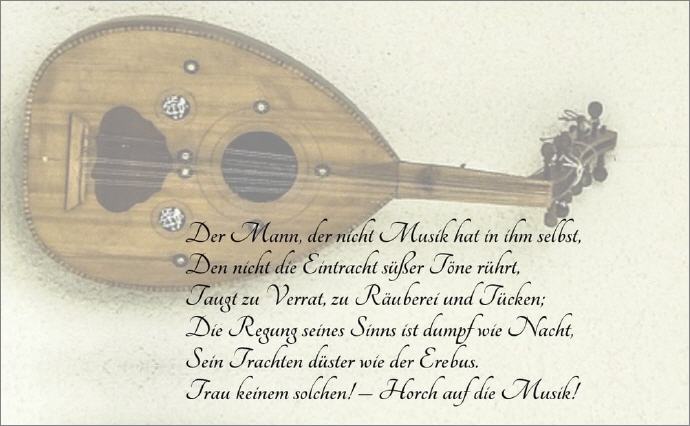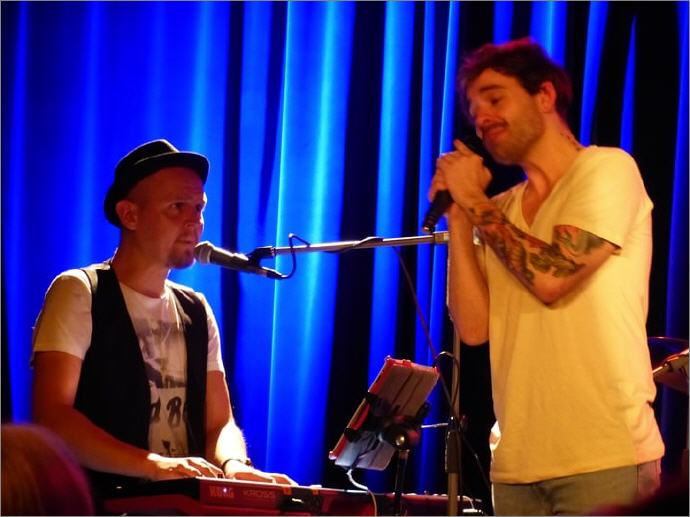William Shakespeare - MUSIKZITATE
|
Höre ich da Musik? Ach, halte Takt! Süße Musik wird bitter, Wenn ihre Zeit zerbricht, ihr Takt nicht Zeit hält! So auch in der Musik des Menschenlebens. Und da hab ich ein feines Ohr, zu prüfen Die Zeit, die bricht an falsch gestimmter Saite. Jedoch für meines Reiches Harmonie Hatt' ich kein Ohr, als meine wahre Zeit brach Music do I hear? Ha, ha! keep time: how sour sweet music is, When time is broke and no proportion kept! So is it in the music of men's lives. And here have I the daintiness of ear To cheque time broke in a disorder'd string; But for the concord of my state and time Had not an ear to hear my true time broke. (Richard) William Shakespeare, Richard II, V, 5 |
The man that hath no music in himself, Nor is not moved with concord of sweet sounds, Is fit for treasons, stratagems, and spoils; The motions of his spirit are dull as night, And his affections dark as Erebus. Let no such man be trusted. - Mark the music. (Lorenzo) William Shakespeare, Der Kaufmann von Venedig V/1 Ein feierliches Lied kann bestens heilen Den vom Irrsinn ergriffenen Verstand: Es wird dein kochendes Gehirn abkühlen. A solemn air, and the best comforter To an unsettled fancy, cure thy brains, Now useless, boiled within thy skull. (Prospero) William Shakespeare, Der Sturm V/1 |

|
Ich widersinniger Tropf, der nicht begriff, zu welchem Zweck Musik uns ward gegeben! Ist's nicht, des Menschen Seele zu erfrischen nach ernstem Studium und der Arbeit Müh? Preposterous ass, that never read so far To know the cause why music was ordain'd! Was it not to refresh the mind of man After his studies or his usual pain? (Lucentio) William Shakespeare, Der Widerspenstigen Zähmung III/1 |
Nun ist seine Seele in Verzückung. Ist es nicht seltsam, dass Schafdärme die Seele aus eines Menschen Leibe ziehen können? Now is his soul ravished! Is it not strange that sheeps' guts should hale souls out of men's bodies? (Benedikt) William Shakespeare, Viel Lärm um Nichts II/3 |
|
Wenn die Musik der Liebe Nahrung ist, Spielt weiter! Gebt mir volles Maß! dass so Die übersatte Lust erkrank' und sterbe. – Die Weise noch einmal! – Sie starb so hin; Oh, sie beschlich mein Ohr, dem Weste gleich, Der auf ein Veilchenbette lieblich haucht, Und Düfte stiehlt und gibt. – Genug! nicht mehr! Es ist mir nun so süß nicht, wie vorher. If music be the food of love, play on; Give me excess of it, that, surfeiting, The appetite may sicken, and so die. That strain again! it had a dying fall: O, it came o'er my ear like the sweet sound, That breathes upon a bank of violets, Stealing and giving odour! Enough; no more: 'Tis not so sweet now as it was before. (Herzog) William Shakespeare, "Was ihr wollt" I/1 |
Laßt keinen Lärm hier machen, liebe Freunde, Wenn eine dumpfe günst'ge Hand Nicht etwa Musik will flüstern meinem müden Geist. Let there be no noise made, my gentle friends; Unless some dull and favourable hand Will whisper music to my weary spirit. (Heinrich IV) William Shakespeare, “Heinrich IV” 2, IV/3 Gebt mir Musik, Musik! Traurige Nahrung Uns, die mit Liebe umgehen. Give me some music; music, moody food Of us that trade in love. (Kleopatra) William Shakespeare, Antonius und Kleopatra, II/5 Schon gut, doch hat Musik oft diese Kraft, Die Böses gut macht, doch auch Schaden schafft Music oft hath such a charm To make bad good, and good provoke to harm. (Herzog) William Shakespeare, Maß für Maß IV/1 |
|
Ach, da seht, welch ein unwürdig Ding Ihr aus mir macht! Ihr wollt auf mir spielen! Ihr wolltet doch wohl wissen, wie man mich handhabt; Ihr wolltet das Herz meines Geheimnisses in den Griff kriegen; Ihr wolltet mir jeden Ton entlocken, von meinem tiefsten bis zu meinem höchsten. Und hier in diesem kleinen Instrument ist viel Musik, eine treffliche Stimme, und doch könnt Ihr es nicht zum Sprechen bringen. – Bei Christi Blut, denkt Ihr, ich sei leichter zu spielen als eine Pfeife? Nennt mich, was für ein Instrument Ihr wollt, Ihr könnt mich zwar verstimmen, aber Ihr könnt mit mir nicht spielen. Why, look you now, how unworthy a thing you make of me! You would play upon me; you would seem to know my stops; you would pluck out the heart of my mystery; you would sound me from my lowest note to the top of my compass; and there is much music, excellent voice, in this little organ; yet cannot you make it speak. 'Sblood, do you think I am easier to be played on than a pipe? Call me what instrument you will, though you can fret me, yet you cannot play upon me. (Hamlet) William Shakespeare, Hamlet III/2 |
Where should this music be? In the air or the earth? It sounds no more: and sure, it waits upon Some god o' the island. Sitting on a bank, Weeping again the king my father's wreck, This music crept by me upon the waters, Allaying both their fury and my passion With its sweet air: thence I have follow'd it, Or it hath drawn me rather. But 'tis gone. No, it begins again. Musik? Ist sie am Boden, in der Luft? Sie klingt nicht mehr. Sie spielt wohl einem Gott auf. Dem Herrn der Insel? Ich saß hier am Strand Und weinte um den König, meinen Vater. Und schlich zu mir Musik her übers Wasser Und stillte meinen Schmerz und seine Wogen Mit ihrem süßen Klang: Drum folgt' ich ihr, Oder zog sie mich nach? Doch sie ist fort. Nein, sie beginnt aufs neu‘. (Ferdinand) William Shakespeare, Der Sturm I, 2 |

Text: Evelyne Dörning
(c)
Collage: Evelyne Dörning
Fotos: P. Grabienski (Dresden 07.04.2017), Pixabay

